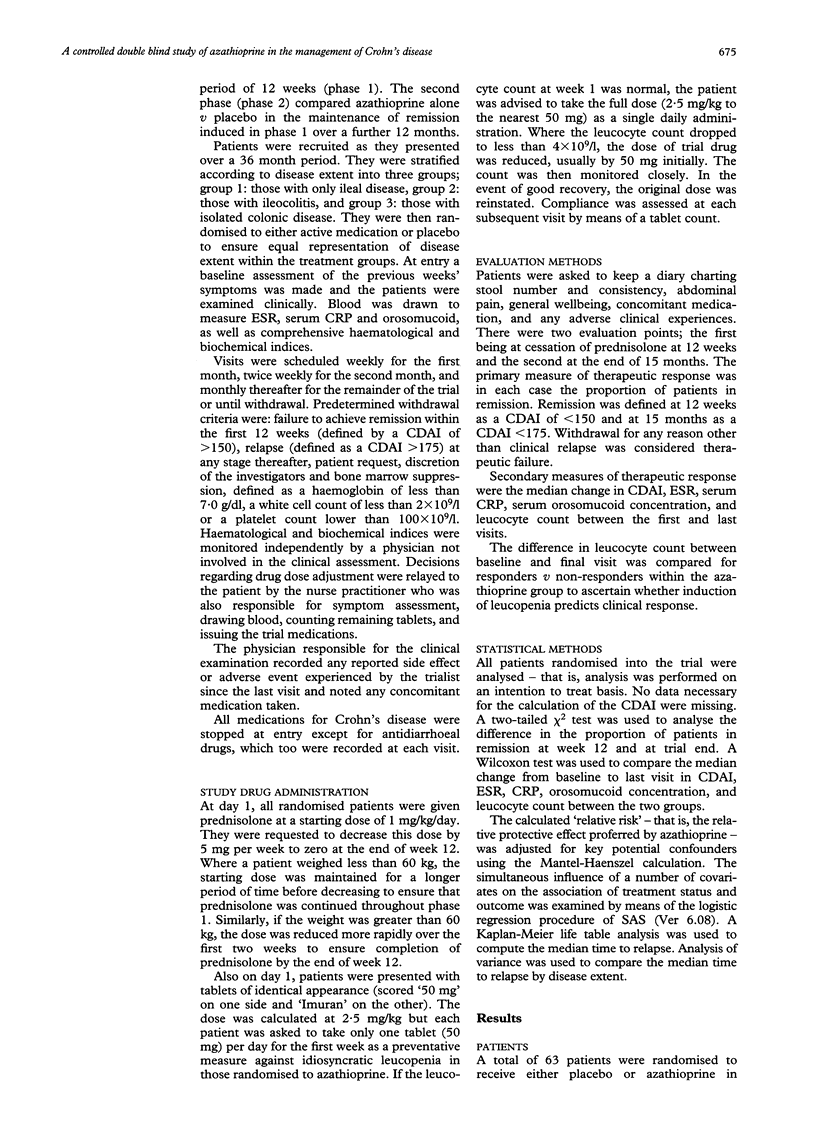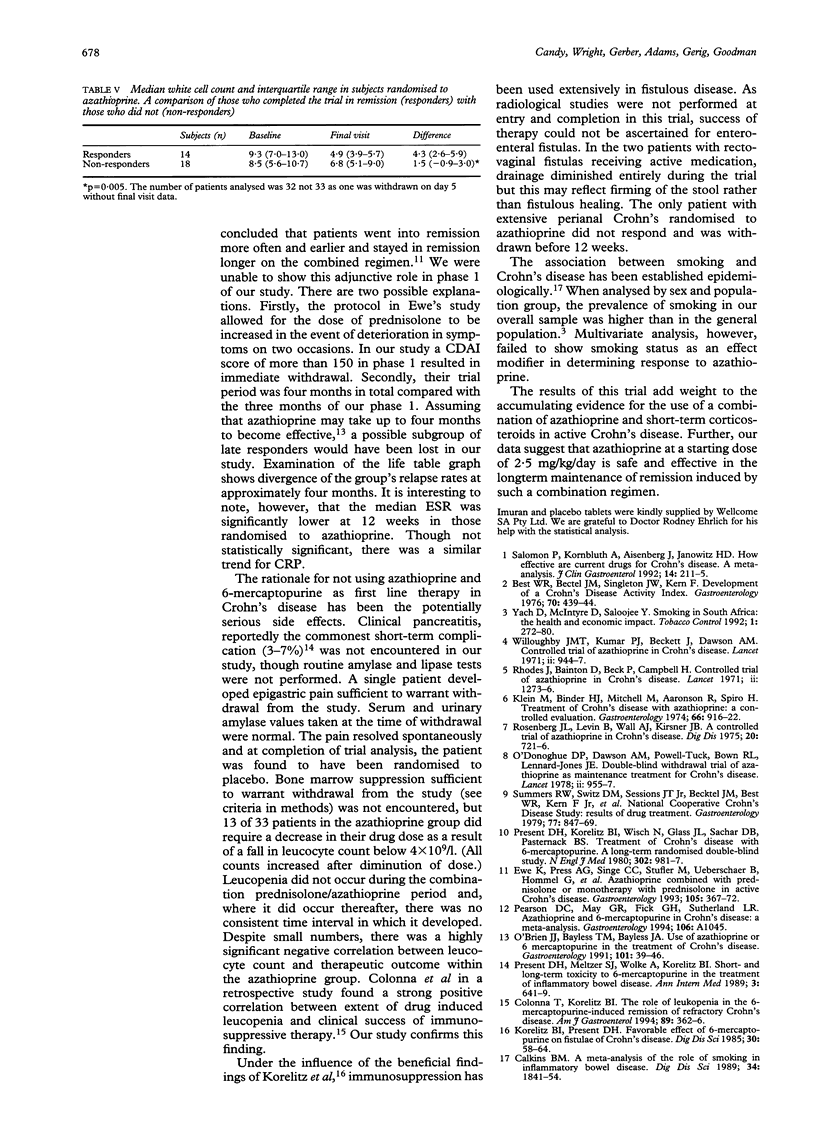Abstract
While immunosuppressive agents are used widely in the management of Crohn's disease, their efficacy has not been well established in randomised controlled trials. This study was designed to examine whether azathioprine increases remission rate when used in conjunction with a diminishing dose regimen of prednisolone over a period of 12 weeks. It further examined whether azathioprine offers any therapeutic advantage over placebo in the maintenance of remission in Crohn's disease over a period of 15 months. Sixty three patients with active Crohn's disease were treated with a 12 weeks diminishing dose of prednisolone and at the same time entered into a randomised, double blind 15 month trial of either azathioprine (2.5 mg/kg) or placebo. Remission rates between the two groups were compared at 12 weeks and at 15 months. There was no significant difference in the proportion of patients who had achieved and maintained remission by week 12 but at 15 months there was a highly significant difference in the proportion of patients in remission (42% receiving azathioprine v 7% receiving placebo), p = 0.001. Using life tables this beneficial effect was reflected as the difference in the median number of days on the trial (p = 0.02). There were significantly greater decreases over the trial period in the median erythrocyte sedimentation rate, C reactive protein, and leucocyte count in the azathioprine group. There were no cases of severe bone marrow suppression or clinical pancreatitis. In conclusion, azathioprine offers a therapeutic advantage over placebo in the maintenance of remission in Crohn's disease.
Full text
PDF




Selected References
These references are in PubMed. This may not be the complete list of references from this article.
- Best W. R., Becktel J. M., Singleton J. W., Kern F., Jr Development of a Crohn's disease activity index. National Cooperative Crohn's Disease Study. Gastroenterology. 1976 Mar;70(3):439–444. [PubMed] [Google Scholar]
- Calkins B. M. A meta-analysis of the role of smoking in inflammatory bowel disease. Dig Dis Sci. 1989 Dec;34(12):1841–1854. doi: 10.1007/BF01536701. [DOI] [PubMed] [Google Scholar]
- Colonna T., Korelitz B. I. The role of leukopenia in the 6-mercaptopurine-induced remission of refractory Crohn's disease. Am J Gastroenterol. 1994 Mar;89(3):362–366. [PubMed] [Google Scholar]
- Ewe K., Press A. G., Singe C. C., Stufler M., Ueberschaer B., Hommel G., Meyer zum Büschenfelde K. H. Azathioprine combined with prednisolone or monotherapy with prednisolone in active Crohn's disease. Gastroenterology. 1993 Aug;105(2):367–372. doi: 10.1016/0016-5085(93)90709-l. [DOI] [PubMed] [Google Scholar]
- Klein M., Binder H. J., Mitchell M., Aaronson R., Spiro H. Treatment of Crohn's disease with azathioprine: a controlled evaluation. Gastroenterology. 1974 May;66(5):916–922. [PubMed] [Google Scholar]
- Korelitz B. I., Present D. H. Favorable effect of 6-mercaptopurine on fistulae of Crohn's disease. Dig Dis Sci. 1985 Jan;30(1):58–64. doi: 10.1007/BF01318372. [DOI] [PubMed] [Google Scholar]
- O'Brien J. J., Bayless T. M., Bayless J. A. Use of azathioprine or 6-mercaptopurine in the treatment of Crohn's disease. Gastroenterology. 1991 Jul;101(1):39–46. doi: 10.1016/0016-5085(91)90457-v. [DOI] [PubMed] [Google Scholar]
- O'Donoghue D. P., Dawson A. M., Powell-Tuck J., Bown R. L., Lennard-Jones J. E. Double-blind withdrawal trial of azathioprine as maintenance treatment for Crohn's disease. Lancet. 1978 Nov 4;2(8097):955–957. doi: 10.1016/s0140-6736(78)92524-2. [DOI] [PubMed] [Google Scholar]
- Present D. H., Korelitz B. I., Wisch N., Glass J. L., Sachar D. B., Pasternack B. S. Treatment of Crohn's disease with 6-mercaptopurine. A long-term, randomized, double-blind study. N Engl J Med. 1980 May 1;302(18):981–987. doi: 10.1056/NEJM198005013021801. [DOI] [PubMed] [Google Scholar]
- Present D. H., Meltzer S. J., Krumholz M. P., Wolke A., Korelitz B. I. 6-Mercaptopurine in the management of inflammatory bowel disease: short- and long-term toxicity. Ann Intern Med. 1989 Oct 15;111(8):641–649. doi: 10.7326/0003-4819-111-8-641. [DOI] [PubMed] [Google Scholar]
- Rhodes J., Bainton D., Beck P., Campbell H. Controlled trial of azathioprine in Crohn's disease. Lancet. 1971 Dec 11;2(7737):1273–1276. doi: 10.1016/s0140-6736(71)90598-8. [DOI] [PubMed] [Google Scholar]
- Rosenberg J. L., Levin B., Wall A. J., Kirsner J. B. A controlled trial of azathioprine in Crohn's disease. Am J Dig Dis. 1975 Aug;20(8):721–726. doi: 10.1007/BF01070829. [DOI] [PubMed] [Google Scholar]
- Salomon P., Kornbluth A., Aisenberg J., Janowitz H. D. How effective are current drugs for Crohn's disease? A meta-analysis. J Clin Gastroenterol. 1992 Apr;14(3):211–215. doi: 10.1097/00004836-199204000-00006. [DOI] [PubMed] [Google Scholar]
- Summers R. W., Switz D. M., Sessions J. T., Jr, Becktel J. M., Best W. R., Kern F., Jr, Singleton J. W. National Cooperative Crohn's Disease Study: results of drug treatment. Gastroenterology. 1979 Oct;77(4 Pt 2):847–869. [PubMed] [Google Scholar]
- Willoughby J. M., Beckett J., Kumar P. J., Dawson A. M. Controlled trial of azathioprine in Crohn's disease. Lancet. 1971 Oct 30;2(7731):944–947. doi: 10.1016/s0140-6736(71)90268-6. [DOI] [PubMed] [Google Scholar]


